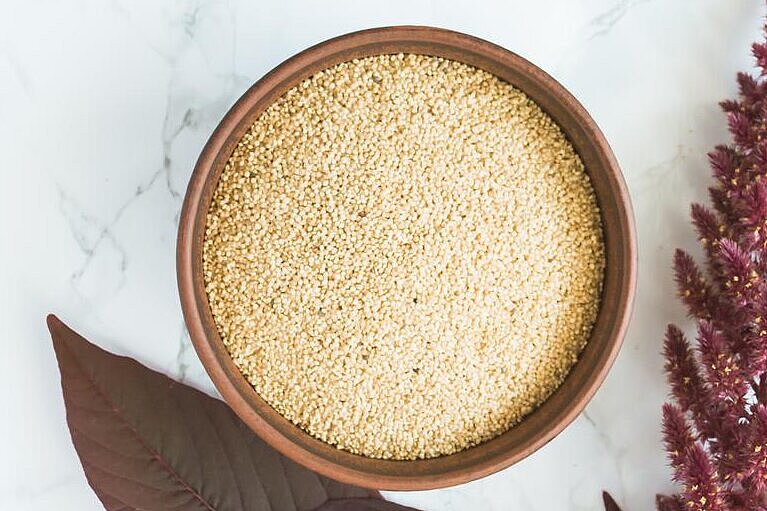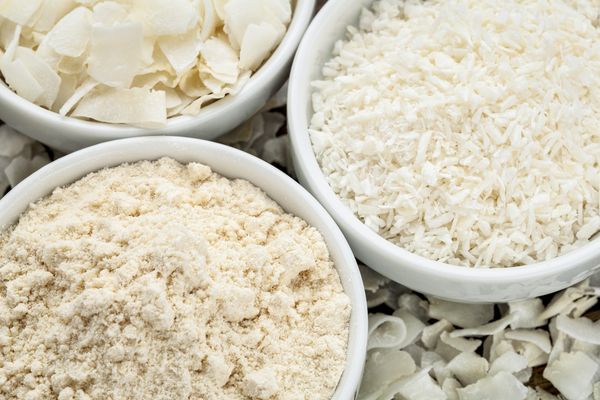Buckwheat flour

What is buckwheat flour?
Buckwheat is not a real grain, but belongs to the so-called pseudo-cereals such as quinoa or amaranth. This means that it does not contain gluten and is therefore suitable for dogs with a gluten intolerance or allergy. Buckwheat originally comes from Asia and was cultivated thousands of years ago. Today it is mainly cultivated in Russia, China and Eastern Europe.
Buckwheat flour is made from the dried and ground seeds of the buckwheat plant. There are different types of buckwheat flour, which differ in color and taste. This depends on whether the seeds are roasted or hulled before grinding. The lighter buckwheat flour has a milder taste, while the darker buckwheat flour has a more intense and nutty flavor.
Is buckwheat flour healthy for dogs?
Buckwheat flour has a number of health benefits for dogs. It contains many important nutrients, such as:
- Iron:Iron is important for the formation of red blood cells and the transportation of oxygen in the blood. An iron deficiency can lead to anemia, which manifests itself in paleness, weakness and fatigue.
- Magnesium: Magnesium is important for the function of nerves and muscles. It also helps to regulate blood pressure and blood sugar levels. A magnesium deficiency can lead to cramps, tremors and cardiac arrhythmia.
- Zinc: Zinc is important for the immune system, wound healing and skin health. It also supports the function of enzymes and hormones in the body. A zinc deficiency can lead to hair loss, skin problems and infections.
- Vitamin B6: Vitamin B6 is important for the metabolism of proteins, fats and carbohydrates. It also helps with the formation of antibodies and neurotransmitters in the brain. A vitamin B6 deficiency can lead to anemia, nervousness and depression.
Buckwheat flour also has a low glycemic index, which means that it causes blood sugar levels to rise only slowly. This is good for dogs with diabetes or who are overweight, as it helps them to control their appetite and maintain their weight.
Are there any disadvantages of buckwheat flour for dogs?
Buckwheat flour also has some disadvantages for dogs. Firstly, it can lead to allergies or intolerances in some dogs. This manifests itself, for example, in itching, skin rashes or diarrhea. If you are feeding your dog buckwheat flour for the first time, you should therefore watch out for such symptoms and consult a vet if necessary.
On the other hand, too much buckwheat flour can lead to digestive problems. This is because buckwheat flour contains a lot of fiber, which is good for intestinal health but can also cause bloating and constipation. In addition, buckwheat flour can impair the absorption of other nutrients in the intestine if it is fed too often or too much. Therefore, you should only ever use buckwheat flour as a supplement to your dog's food and not as the main ingredient.
How do I feed buckwheat flour to my dog?
You can feed your dog buckwheat flour in different ways. Firstly, you can use it as an additive to your dog's food to enrich it with more nutrients and fiber. For example, you can mix some buckwheat flour with water or broth and mix it into your dog's food. Make sure that you do not replace more than 10 percent of the food with buckwheat flour.
You can also use buckwheat flour to bake healthy treats for your dog. For example, you can mix buckwheat flour with egg, rolled oats, pureed vegetables or fruit and a little peanut butter or cottage cheese to make a dough and form cookies. You can then bake them in the oven and offer them to your dog as a reward or snack.
Buckwheat flour is a gluten-free flour that has many health benefits for dogs. It contains many important nutrients such as iron, magnesium, zinc and vitamin B6. It also has a low glycemic index, which is good for dogs with diabetes or obesity. However, buckwheat flour can also lead to allergies, intolerances or digestive problems if it is fed too often or too much. You should therefore only ever use buckwheat flour as a supplement to your dog's food and not as the main ingredient. You can feed buckwheat flour as an addition to food or as an ingredient in healthy treats for your dog.
Properties 7
Are you looking for other ingredients with a specific property?
Just click on them to find more.
If you notice any signs of hypersensitivity or poisoning in your dog, you should see your vet immediately. We are not a substitute for a vet, but we try to be as accurate as possible. Every dog reacts differently and we recommend you get a second opinion or consult your vet if in doubt.
Stay healthy and take good care of your four-legged friend!😊
Similar to Buckwheat flour
Amaranth flour is a fine, light brown flour made from the dried and ground seeds of the amaranth plant. The seeds are very small and have a round or oval shape. They contain a lot of starch,...
Quinoa flour has several benefits for your dog's health that can make it a valuable part of their diet. Here are some of them: Quinoa flour is rich in essential amino acids that dogs can't make...
Millet flour is a gluten-free flour made from millet. Millet is a type of grain that is one of the oldest cultivated plants known to mankind and is grown in many parts of the world. Millet is rich...
Coconut flour is a by-product of coconut oil production. After the coconut meat has been pressed to extract the oil, a dry and fibrous residue remains. This is then ground into a fine flour that has...



